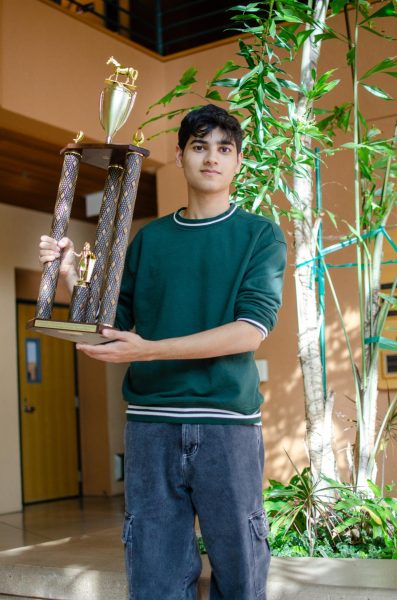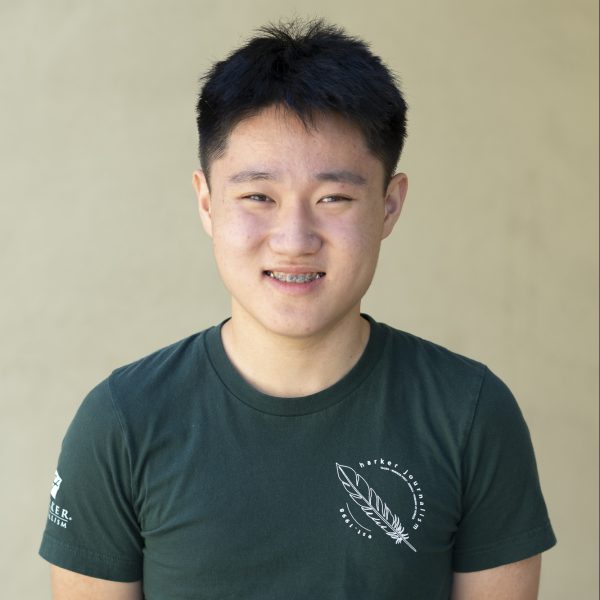
A seventh grader tags along with a group of high schoolers, shy, nervous and unsure of how to approach conversation with them or how to ask a question out of fear of looking inexperienced. Ansh Sheth (12) can empathize, remembering his first debate tournaments as a clueless middle school student himself. Now, as the captain of the debate team, he mentors the kids who experience what he did all those years ago.
“I can understand some of their concerns,” Ansh said. “I am a figure that they can confide in, instead of having to be nervous. I value that, and I appreciate that they can do that.”
Initially an elective that he arbitrarily took in 6th grade, debate grew to become something that Ansh stuck with throughout middle and high school, with each experience and competition motivating him to learn more. He primarily debates in Lincoln-Douglas or Public Forum formats, but the flexibility and versatility has kept it fresh and interesting.
“With most other activities, you’re kind of forced into this one box of what you learn about,” Ansh said. “But with debate, you are forced to look at a wide variety of topics. You have to like to look at both sides of every equation. I love that sense of open-mindedness and being open to new perspectives, which I feel like I’ve carried on to a lot of the other things I do.”
This consideration of different perspectives absolutely appears in Ansh’s role as Oeconomia’s co-president, which he joined after taking AP Economics in sophomore year. As the economics club, Oeconomia publishes Equilibrium, a journal of student-written articles, which Ansh sees as a unique initiative to bring different economic perspectives to the greater Harker community.
“You see that economics has been used primarily by the corporate elites who get to pursue profit at the expense of underprivileged populations,” Ansh said. “So one of the things I’m really interested in, related to econ and public policy, is using economic concepts for the benefit of society through things like inequality reduction, as well as research into why those inequalities exist.”
Topics like economics and government, with their focus on justice and policy, closely relate to Ansh’s passion for debate, and he often chooses to tackle these sorts of arguments. Debate teacher Greg Achten, who taught Ansh since middle school, has watched him grow to become an integral part of the team culture, and also an able debater.
“He is one of our debaters who is capable of going for a wide variety of arguments,” Achten said. “There are all sorts of different kinds of arguments: theoretical arguments, arguments about postmodern philosophy, but also arguments about public policy. He is amongst the most capable students that I have ever coached in terms of being able to go for a wide variety of arguments.”
This competitive side of debate, developing arguments with teammates and competing for long hours at tournaments, is not everything. For Ansh, the larger community of debaters and the little spontaneous moments that arise between him and his teammates also contribute to his love for debate.
When Panav Gogte (12) first met Ansh through debate in sixth grade, he was initially intimidated by his serious attitude and extensive knowledge of debate. But after getting to know him and competing in tournaments together, Panav sees a more light-hearted side of Ansh.
“Ansh is super easy to get along with,” Panav said. “he makes conversations flow really easily, and he makes you feel extremely comfortable. He does that very uniquely, and he has a very light and bubbly personality. It’s really fun spending time with him.”
Arjun Gurjar (12) also agrees with this assessment of Ansh. Another longtime friend of Ansh’s, Arjun first met him in middle school, where his hyper energy shone through. Now, as seniors, that same energy persists as Ansh grew more comfortable with expressing himself.
“He’s very unashamed of who he is,” Arjun said. “He’s very much himself no matter what setting he’s in. He’s very comfortable with himself and very confident with himself.”


















![“[Building nerf blasters] became this outlet of creativity for me that hasn't been matched by anything else. The process [of] making a build complete to your desire is such a painstakingly difficult process, but I've had to learn from [the skills needed from] soldering to proper painting. There's so many different options for everything, if you think about it, it exists. The best part is [that] if it doesn't exist, you can build it yourself," Ishaan Parate said.](https://harkeraquila.com/wp-content/uploads/2022/08/DSC_8149-900x604.jpg)




![“When I came into high school, I was ready to be a follower. But DECA was a game changer for me. It helped me overcome my fear of public speaking, and it's played such a major role in who I've become today. To be able to successfully lead a chapter of 150 students, an officer team and be one of the upperclassmen I once really admired is something I'm [really] proud of,” Anvitha Tummala ('21) said.](https://harkeraquila.com/wp-content/uploads/2021/07/Screen-Shot-2021-07-25-at-9.50.05-AM-900x594.png)







![“I think getting up in the morning and having a sense of purpose [is exciting]. I think without a certain amount of drive, life is kind of obsolete and mundane, and I think having that every single day is what makes each day unique and kind of makes life exciting,” Neymika Jain (12) said.](https://harkeraquila.com/wp-content/uploads/2017/06/Screen-Shot-2017-06-03-at-4.54.16-PM.png)








![“My slogan is ‘slow feet, don’t eat, and I’m hungry.’ You need to run fast to get where you are–you aren't going to get those championships if you aren't fast,” Angel Cervantes (12) said. “I want to do well in school on my tests and in track and win championships for my team. I live by that, [and] I can do that anywhere: in the classroom or on the field.”](https://harkeraquila.com/wp-content/uploads/2018/06/DSC5146-900x601.jpg)
![“[Volleyball has] taught me how to fall correctly, and another thing it taught is that you don’t have to be the best at something to be good at it. If you just hit the ball in a smart way, then it still scores points and you’re good at it. You could be a background player and still make a much bigger impact on the team than you would think,” Anya Gert (’20) said.](https://harkeraquila.com/wp-content/uploads/2020/06/AnnaGert_JinTuan_HoHPhotoEdited-600x900.jpeg)

![“I'm not nearly there yet, but [my confidence has] definitely been getting better since I was pretty shy and timid coming into Harker my freshman year. I know that there's a lot of people that are really confident in what they do, and I really admire them. Everyone's so driven and that has really pushed me to kind of try to find my own place in high school and be more confident,” Alyssa Huang (’20) said.](https://harkeraquila.com/wp-content/uploads/2020/06/AlyssaHuang_EmilyChen_HoHPhoto-900x749.jpeg)



